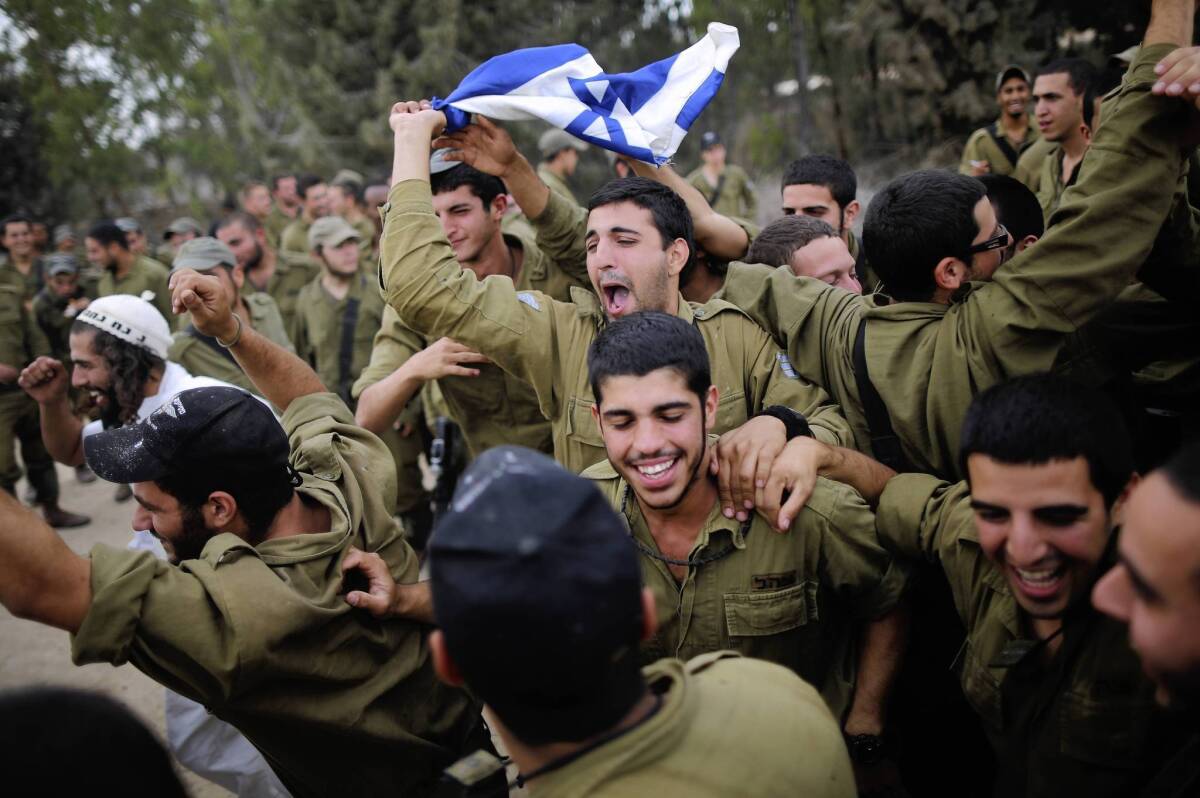Israelis begin to recover from a week of conflict

- Share via
KIRYAT MALACHI, Israel — As the news sunk in Thursday that a cease-fire had ended an eight-day crisis that saw about 1,500 rockets launched from the Gaza Strip, Israelis began cleaning up, rebuilding and getting their lives back in some semblance of order.
Military flatbeds loaded with tanks headed north, away from Gaza, on Thursday as the Israeli government appointed two committees to help damaged communities and injured residents, tally the destruction and assess compensation. Prime Minister Benjamin Netanyahu urged the panels to work “quickly and without bureaucracy.”
Amid hopes the cease-fire would hold, economists pegged the cost to Israel of the weeklong conflict at nearly $1 billion, including $35,000 for each of several hundred Iron Dome interceptor missiles fired at incoming rockets, the wages of reserve soldiers and lost productivity as tens of thousands of businesses closed across the country. Separately, tourism officials estimated their industry suffered a $250-million hit from canceled bookings and related setbacks.
TIMELINE: Israel-Gaza conflict
Lior Yossef, 24, an employee at a small photo and electronics store in Ashkelon that reopened Thursday, said business was decent as shoppers stocked up on printer ribbons and batteries after being cloistered in their houses the last week. A nail salon next door wasn’t doing as well, however. “During a crisis, people don’t think it’s right to pamper themselves,” said Gila Elcham-Gueata, the salon’s owner. “Hopefully that’ll change.”
Israel suffered its sixth casualty — compared with more than 160 for the Palestinians — when an army reserve officer died of his wounds Thursday. Separately, security forces announced the arrest of an Arab Israeli allegedly linked to the militant groups Hamas and Islamic Jihad in connection with a bomb placed on a Tel Aviv bus Wednesday that was detonated by cellphone, injuring more than 20 people.
In Kiryat Malachi, a coastal town of 21,000 in the hard-hit southern part of Israel, there were early signs of normality after a week spent dashing for bomb shelters. The community suffered half the nation’s fatalities when a rocket slammed into the top floor of an apartment building Nov. 15, killing three people.
Sarit Hazan, a 32-year-old homemaker, sat on a wall with two other residents beside a garbage bag filled with bread, leftovers from the weeklong Jewish mourning period known as shiva that was held for their three dead neighbors.
Thunder was heard some distance away and Hazan’s 2-year-old son flinched. “He’s still terrified,” said Hazan, dressed in animal slippers and black pants adorned with pink hearts. “That said, it’s a relief to finally take a walk outside again.”
Others expressed pleasure in the simple joy of doing laundry, cleaning their houses and buying groceries, a return to basics that marked the end of the emergency. “For eight days, we’ve been in prison,” said Saula Yusupov, 68, a retired seamstress, walking past the rocket-damaged building as a plastic toy and towel dangled from a 30-foot tree, propelled there by the blast. “For a whole week, we were too afraid to even bathe.”
In the top-floor apartment, the rocket left a tangle of dust-covered religious books, upended furniture and a Power Rangers videotape beside a now-dead groom’s oversized wedding picture. Tomatoes ripened on a kitchen counter near government stickers that read “uninhabitable” in large red letters.
Although many area residents expressed relief that they no longer had to duck for cover up to 20 times a day, some criticized the Egyptian-brokered cease-fire between Hamas and Israel announced late Wednesday. “I’m against it,” said Avi Bleich, a food-service employee, standing below a handwritten banner that read, “Blood is not for Sale.”
“This is only an aspirin when we need a full course of antibiotics,” he added. “We should have gone into Gaza with ground troops and ended this once and for all. It will happen again.”
A short distance away, town official Arie Pikel, 60, sat eating a sandwich in Kiryat Malachi’s emergency headquarters deep underground, in a bunker across the street from the town hall. For the last several days he had worked around the clock arranging housing for families displaced by the attacks, halls for families
to sit shiva and compensation.
The next step will be emergency drills, student discussions to cope with the stress and counseling for those who have lost family members or been directly affected.
But the disaster has also touched him personally. Pikel’s wife and daughter were in the apartment building that was hit by a rocket, which slammed into the top floor. “They were lower down in the stairway,” he said. “Ten seconds later and they would’ve been hit.”
As she wrapped up her day’s work, Elcham-Gueata reflected on the last week. “I’m very happy there’s a cease-fire,” said the salon owner. “It doesn’t matter who won or lost, that’s all nonsense. The fact that I’m still here and don’t have to worry about running into a shelter in the next five seconds, what a relief.”
Batsheva Sobelman of The Times’ Jerusalem bureau contributed to this report.
More to Read
Sign up for Essential California
The most important California stories and recommendations in your inbox every morning.
You may occasionally receive promotional content from the Los Angeles Times.












